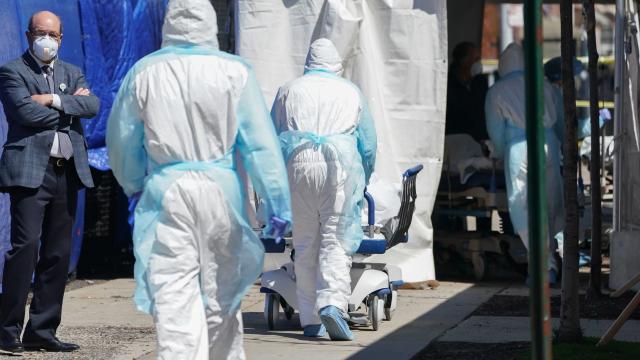A grim look inside U.S. hospitals confirms impressions gathered from medical professionals and state officials in recent weeks: American hospitals are in crisis. The Department of Health and Human Services’s inspector general’s office interviewed administrators from 323 hospitals in the United States, finding shortages across the board—including staff, medical supplies, tests, beds, and personal protective equipment—and anticipating severe ventilator shortages in the weeks to come. Staffers are stressed. Hospitals are running out of cash. The U.S. government is sowing chaos and confusion. And nobody seems to have any good solutions.
One administrator said that the entire industry has only hundreds of tests, when millions are needed. Lag time for test results, sometimes as long as seven days, is taking up precious time as patients awaiting results take up beds, staffers’ attention, and critical supplies. One administrator told the office of the inspector general that staffers use “a lot of PPE” on “rule-outs,” adding that “when it’s a negative, we basically used all that PPE for nothing.” The survey was taken from March 23 to March 27, so the situation now may in fact be even more dire.
Not only is PPE now almost prohibitively costly (one administrator said that masks, once 50 cents ($0.82), are going for $US6 ($10)), but some facilities have been receiving useless masks from the federal government’s limited back-up supplies; one hospital reported receiving children’s masks, and another, masks with dry-rotted elastic bands. (Montgomery County, Alabama, reportedly received 5,880 such long-expired masks.) They’ve had to lock down supplies to prevent theft, and one administrator reported catching a person attempting to pilfer masks in the hospital lobby.
In order to stretch PPE beyond its intended lifetime, medical professionals are reusing disposable masks, sterilising them with UV light, wearing surgical masks over N95 masks, and even wearing “construction masks or handmade masks and gowns.” Another said that staffers constructed 500 face shields themselves “out of office supplies.” In order to stretch disinfectants, some have been making their own, out of “on-hand chemicals” like chlorine, and another had enlisted a local distillery to make hand sanitizer using alcohol and ultrasound gel. Ventilators are being improvised, including jury-rigging anesthesia machines. Hospitals are opening fairgrounds, college dorms, and shuttered prisons as “alternative facilities.”
Media has celebrated healthcare workers for staying upbeat during the crisis, but urgent conditions listed in the report bely more brutal working conditions than they let on. On social media, some healthcare workers are documenting the steps they’re taking to protect themselves.
U.S. Hospitals are burning through money to do all of this, facing, as one administrator put it, “an absolute financial nightmare”: suspending elective procedures, which would otherwise contribute to cash savings, has drained financial reserves while they spend money preparing for an influx of patients, and some have already started laying off staffers.
Remaining qualified staff are already in short supply and overworked, and administrators worry that the risk of contracting the virus, exacerbated by a lack of PPE, will compound those problems. Hospitals are retraining nurses and anesthesiologists to care for people on ventilators—each of which, one administrator noted, requires a respiratory therapist to monitor. “You can build thousands of ventilators, but you need an army to manage that equipment and care for those patients,” an administrator said.
The report calls on the U.S. government to produce more test kits and equipment. President Donald Trump could, as he’s been called on for the past month to do, expand the use of the Defence Production Act to streamline the supply chain, muster resources where they’re needed, and stop forcing hospitals and states to cut exorbitant checks to highway robbers (We mean that quite literally: The Illinois assistant comptroller handed $US3.5 ($6) million to a dude in a McDonald’s parking lot a few weeks ago). Even when the federal government has ordered supplies, manufacturers have been complaining that it’s offered no guidance on where to send them.
The report notes that the $US2 ($3) trillion stimulus bill, the U.S. CARES Act, was passed after the survey was taken, and it includes $US100 ($164) billion for hospitals. But the government is failing in its most basic function: providing reliable, consistent information. The report mentions information like details on “getting supplies from the national stockpile” (and this was before the Trump administration changed its definition of the strategic national stockpile to match Jared Kushner’s). But it also states that CDC and state guidance are often “conflicting,” for example, about when to use a mask and what kind. “It’s difficult when a doctor or nurse shows you legitimate information from legitimate sources and they’re contradictory,” an administrator said. The report states that administrators repeatedly asked for “evidence-based guidance” from a single regulatory body as well as predictive data that would help them shore up for the future.
The takeaway is that healthcare workers are hurting. “The level of anxiety among staff is like nothing I’ve ever seen,” one administrator told surveyors, describing the fear of contracting the virus and spreading it to family members. Another said that “health care workers feel like they’re at war right now…[they] are seeing people in their 30s, 40s, 50s dying… This takes a large emotional toll.”
